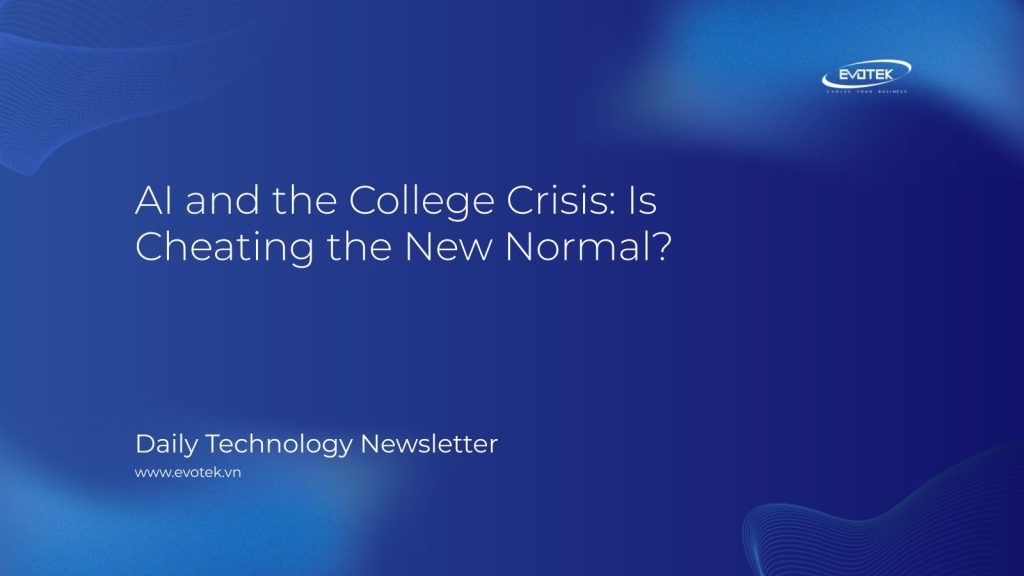The rise of sophisticated AI like ChatGPT has sparked a seismic shift in higher education, prompting a critical question: has AI unraveled the academic project? This isn’t just about students finding easier ways to complete assignments; it’s about the very essence of learning, critical thinking, and the value of a college degree.
One Columbia University student, Chungin “Roy” Lee, openly admits to using AI to complete nearly all of his coursework. Lee’s perspective is that many college assignments are irrelevant and “hackable” by AI. He views his time at an Ivy League school primarily as an opportunity to network and find future business partners. Lee’s story is not an isolated incident. Surveys suggest that a significant percentage of college students are using AI to assist with homework, raising concerns about the long-term impact on their education.
AI tools are now capable of:
- Taking notes during lectures
- Creating study guides and practice tests
- Summarizing complex texts
- Brainstorming, outlining, and drafting essays
- Automating research and data analysis
- Assisting with coding and debugging
The ease and accessibility of AI have led some students, like Sarah from Wilfrid Laurier University, to rely heavily on these tools. Sarah admits to using ChatGPT for all her classes, praising its ability to significantly improve her grades and reduce the time spent on assignments. However, she also acknowledges the potential for dependency and the impact on her critical thinking skills.
Professors Fight Back: AI Detection and Assignment Revamps
Educators are struggling to adapt to this new reality. Some have attempted to “AI-proof” their assignments by returning to traditional methods like in-class essays and oral exams. Others have tried to detect AI-generated content using specialized software or by embedding subtle “traps” within assignments.
However, the effectiveness of these methods is questionable. Studies have shown that professors often fail to identify AI-generated work, and AI detection tools can produce false positives, particularly for neurodivergent students or those who speak English as a second language. Moreover, students are constantly finding new ways to circumvent detection methods, such as paraphrasing AI-generated text or using multiple AI platforms to “launder” their work.
The Broader Implications: An “Illiterate” Generation?
The widespread use of AI in education raises profound concerns about the future of learning and the value of a college degree. Troy Jollimore, a professor at Cal State Chico, fears that “massive numbers of students are going to emerge from university with degrees, and into the workforce, who are essentially illiterate.” This includes both a literal lack of writing skills and a broader lack of historical and cultural knowledge.
Denise Pope, a senior lecturer at Stanford, emphasizes the connection between cheating and mental health, well-being, and belonging. She suggests that addressing the root causes of academic dishonesty requires a more holistic approach to education.
The Business of Cheating: AI Startups Emerge
The demand for AI-powered academic assistance has also spawned a new wave of startups. Chungin “Roy” Lee, the Columbia student mentioned earlier, launched Interview Coder, a tool designed to help users cheat during remote job interviews. Despite facing disciplinary action from the university, Lee sees his work as a form of innovation, pushing both education and the tech industry to evolve.
Lee’s latest venture, Cluely, aims to provide real-time AI assistance in all aspects of life, including education. The company’s manifesto states, “We built Cluely so you never have to think alone again,” highlighting the potential for AI to fundamentally alter the way we learn and solve problems.
The Future of Education: Adaptation or Obsolescence?
The rise of AI in education has exposed existing flaws in the system, including the transactional nature of higher education and the pressure to prioritize career prospects over intellectual growth. As AI becomes increasingly integrated into the learning process, educators and policymakers face the challenge of redefining the purpose of education and equipping students with the skills they need to thrive in an AI-driven world.
Michael Johnson, an associate provost at Texas A&M University, argues that learning hard things, whether it’s algebra or chores, builds self-esteem and work ethic. The question is whether AI will ultimately undermine these crucial aspects of development or whether it can be harnessed as a tool to enhance learning and creativity.

 日本語
日本語 한국어
한국어 Tiếng Việt
Tiếng Việt 简体中文
简体中文